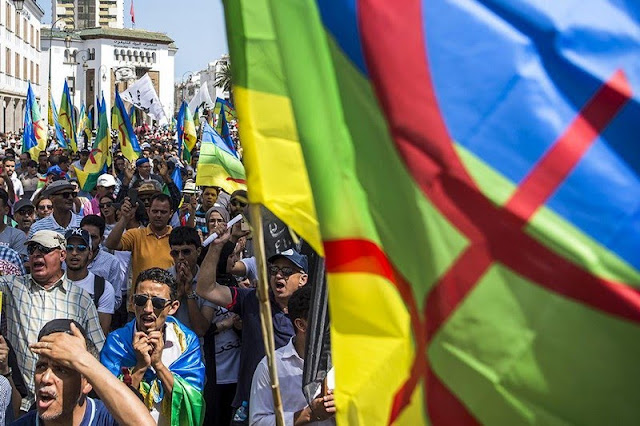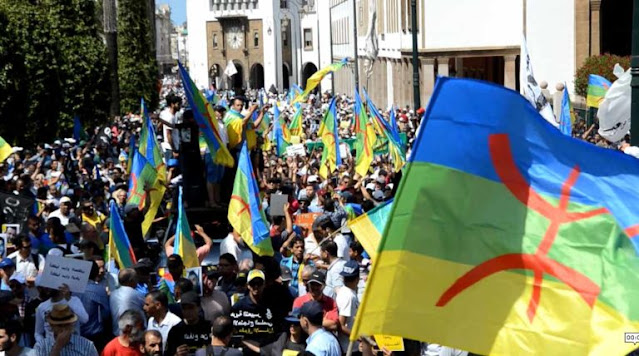Discover the cultural heritage of Morocco through its Amazigh culture, a vibrant and diverse tradition that has shaped the country's history and identity. From its language and traditions to its colorful art and music, the Amazigh culture is a valuable asset that continues to contribute to Morocco's development and cultural richness. In this article, we will delve into the significance of the Amazigh culture in Morocco, explore its history and traditions, and highlight why it matters for the country's future growth and success.
What is the Significance of the Moroccan Amazigh Culture?
Moroccan Amazigh culture is an incredibly diverse and fascinating aspect of Moroccan society. With a rich history, unique language, and vibrant traditions, the Amazigh people have played an important role in shaping the cultural identity of Morocco. Despite facing challenges over the years, the Amazigh people have continued to preserve their customs and celebrate their heritage.
Firstly, the Moroccan Amazigh culture has a significant impact on the country's history. The Amazigh people are the original inhabitants of Morocco and have played a vital role in shaping the country's culture and traditions. They have a rich history that dates back to prehistoric times, and their culture has evolved over the centuries. Additionally, the Amazigh people have a long history of resistance against colonial powers, and their struggle for independence has become an integral part of the country's history.
Moreover, the Moroccan Amazigh culture has a unique language that distinguishes it from the rest of the country. The Amazigh language, also known as Tamazight, is one of the oldest languages in North Africa and is spoken by millions of people. Despite its historical significance, the Amazigh language has been marginalized for centuries, with Arabic being the official language of Morocco. However, in recent years, the government has recognized Tamazight as an official language, and efforts are being made to promote and preserve it.
Furthermore, the Moroccan Amazigh culture has a rich tradition that is reflected in its colorful textile, dance, and festivals. The Amazigh people have a deep connection to their land, and their traditions are rooted in their relationship with nature. For instance, the Imilchil Marriage Festival, also known as the Festival of the Maidens, is an annual event that celebrates the harvest season and the Amazigh tradition of marriage.
Additionally, it is worth noting that the Amazigh people played a significant role in helping the kings of Morocco stay in power. Historically, the Arab population in Morocco was opposed to the monarchy and sought to establish a republic. However, the Amazigh people supported the monarchy and helped the kings of Morocco resist attempts to overthrow them. This support was instrumental in maintaining the stability of the country and preserving the traditional system of government. Therefore, the Amazigh culture is not only significant for its unique language, traditions, and history but also for its political and social influence in the country.
Furthermore, the Amazigh people's preference for a kingdom over a republic is rooted in their cultural identity. The Amazigh culture values a strong connection to the land and a sense of community and tradition, which they believe are best served by a monarchy. The Amazigh people also see the monarchy as a way to preserve their cultural heritage and promote their language and traditions, which were suppressed during the Arabization process in the 20th century. In contrast, the Arab population's desire for a republic is often driven by a desire for modernization and secularization, which can clash with traditional Amazigh values.
The Amazigh people's support for the monarchy is evident in their participation in important cultural events and ceremonies that honor the kings of Morocco. For example, the annual Imilchil Marriage Festival, which celebrates the union of Amazigh tribes, is attended by the king and queen of Morocco, who play an important role in the festivities. Similarly, the Feast of Moulay Idriss, a major religious celebration in Morocco, is also an occasion for the king and other members of the royal family to connect with the Amazigh community and reaffirm their support for the monarchy.
Additionally, the Amazigh culture has been a source of inspiration for Moroccan art, colorful textile, and literature. Many Moroccan artists and musicians draw on Amazigh themes and motifs in their work, reflecting the cultural richness and diversity of the country. In recent years, there has also been a growing recognition of the importance of Amazigh language and culture in Moroccan education, with efforts to promote the teaching of Amazigh languages in schools and universities.
Despite the growing appreciation for the Amazigh culture, there are still challenges that the Amazigh people face in Morocco. Discrimination against Amazigh people in employment, education, and politics remains a concern, and there are ongoing struggles to protect Amazigh land rights and cultural heritage. However, the Amazigh people continue to resist marginalization and fight for their rights, drawing on their cultural heritage as a source of strength and inspiration.
It is important to note that while the Amazigh population in Morocco is significant, they make up approximately 60% of the population, with Arabs comprising the remaining 40%. This diversity is what makes Morocco such a unique and fascinating country, with a rich mix of cultural traditions and influences. It is essential to recognize and celebrate the contributions of both Amazigh and Arab cultures to Moroccan society, and to work towards greater unity and understanding between these communities.
Furthermore, there is a long history of intermarriage and cultural exchange between Amazigh and Arab communities in Morocco. It is also important to note that many Moroccans of different cultural backgrounds have coexisted peacefully and with mutual respect for generations. In fact, it is not uncommon for Amazigh and Arab individuals to marry and start families, and for their children to grow up with a deep appreciation and understanding of both cultures. This intermingling of cultures has contributed to the unique and diverse character of Moroccan society, and is something that is deeply valued and celebrated by many people in the country. The love and understanding between Amazigh and Arab communities is a testament to the strength and resilience of the Moroccan people, and is a shining example of how cultural diversity and acceptance can bring people together in harmony and unity.
The Amazigh culture plays an integral role in Moroccan society, shaping everything from language and music to food and clothing. It is a culture that is deeply rooted in the land and the traditions of the people who have lived there for centuries, and which continues to evolve and adapt in response to changing times and circumstances. One of the key strengths of the Amazigh culture is its resilience and adaptability, which has allowed it to survive and thrive in the face of countless challenges over the years.
Today, the Amazigh culture is an important source of identity and pride for many Moroccans, particularly those from rural areas and smaller communities. This is reflected in the many festivals and celebrations that take place throughout the year, showcasing the rich history and traditions of the Amazigh people. These festivals often involve traditional music, dancing, and food, and provide an opportunity for people from different regions and backgrounds to come together and celebrate their shared heritage.
At the same time, the Amazigh culture is also playing an increasingly important role in contemporary Moroccan society, particularly in areas such as education and politics. Many Amazigh activists and advocates are working to promote greater recognition and appreciation for Amazigh culture and language, and to ensure that it is given the same level of respect and support as other aspects of Moroccan society. This includes efforts to incorporate Amazigh language and culture into the national education system, as well as campaigns for greater representation of Amazigh people in government and other positions of power.
Indeed, the Amazigh culture has a significant impact on the Moroccan society, including the political arena. It is worth noting that about 80% of the members in the Moroccan parliament and government are Amazigh people, which clearly demonstrates their political representation and influence. Moreover, in the royal palaces, the Amazigh people hold key positions, including being part of the king's inner circle and serving as his bodyguards. It is important to mention that these Amazigh individuals are highly educated and chosen based on their capabilities, rather than their ethnicity. This signifies the importance of meritocracy in the Moroccan political system, and the willingness of the royal family to embrace and empower the Amazigh culture.
Furthermore, the Amazigh culture is also evident in the architecture and traditions of Morocco. Many of the country's historical landmarks, such as the Kasbahs, were built by Amazigh people, and their influence can be seen in the intricate designs and patterns used in their construction. Additionally, Amazigh traditions, such as the annual Imilchil Marriage Festival, are still celebrated in various parts of Morocco and attract tourists from around the world.
It's worth noting that the preservation and celebration of the Amazigh culture is not only limited to Morocco but also extends to other North African countries. This recognition and appreciation of the Amazigh culture across the region further reinforces its significance and importance.
As Morocco continues to modernize and grow, the Amazigh culture remains a vital part of its identity and a source of pride for its people. With its rich history and diverse traditions, the Amazigh culture is a valuable asset that continues to contribute to Morocco's development and cultural richness.
In the end, the significance of the Amazigh culture in Morocco is multifaceted and deeply rooted in the country's history, language, traditions, and identity. It is a testament to the resilience and vibrancy of the Amazigh people and their contributions to the country's heritage and development. As Morocco continues to move forward, the recognition and celebration of its Amazigh culture will undoubtedly play a vital role in its future growth and success.




